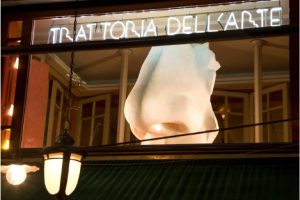 Help Wanted: New midtown Italian bistro hiring seasoned hospitality professionals. New York City experience a must. Trattoria Dell’Arte, 900 Seventh Avenue.
Help Wanted: New midtown Italian bistro hiring seasoned hospitality professionals. New York City experience a must. Trattoria Dell’Arte, 900 Seventh Avenue.
My inability to pronounce the name should have scared me off. During three years in Manhattan I’d never set foot in a place like Trattoria Dell’Arte. I couldn’t afford to.
But in November 1988, I really needed the work. My last full-time job was nine months in the past, and the savings account was nearly empty. My girlfriend and I had just signed a lease. Temp-agency work wasn’t cutting it.
So I stood on the sidewalk across the street from Carnegie Hall, managing my butterflies. From an upstairs window, a huge ceramic nose menaced me with its flared nostrils. I tried to decipher the menu posted by the entrance: Pinci con Broccoli Rabe, Ossobuca Tordelli, Spaghetti Guanciale Aglio Olio.
Et cetera.
The prices, however, needed no translation. This job, if I could land it, would pay big. I looked through the smoked-glass windows and tried to keep breathing. At mid-afternoon, the dining room was closed, but a gaggle of very pretty young men in white shirts and black aprons were setting tables.
I took a deep breath and stepped inside. Someone was being interviewed ahead of me, so I visited the pissoir to check myself in the mirror. The room was bigger than your average Manhattan apartment, done up in imported black marble. The urinals looked like artwork. The soap smelled pricy.
The maitre d’, an impeccably-groomed Austrian named Werner, conducted the interview. He had an $800 suit, a professionally-sculpted goatee, and a clipped accent. Tell me about your experience, he said.
My two previous restaurant jobs had been at upstate mom-and-pop places, but I had arrived at the interview with a carefully-crafted lie: a very fancy Upper West Side Italian restaurant had recently gone out of business. That was my New York hospitality experience, I said. Two years.
Werner looked at me carefully and nodded slowly. “Good, good,” he said. “We are very busy. How soon can you start?”
Right away, of course.
“You will trail one of our waiters for three nights and take a few tables,” Werner said. “Then you will have your own station.” He handed me a menu to study and told me where to buy my uniform.
“See you tomorrow,” he said. “Look sharp.”
On the train back to Queens that day I read the menu and tried out phrases like Cotechino sausage and livornese sauce and gremolata bread crumbs, trying not to sound like what I was: a hick.
Tomorrow arrived, a Friday. I cut myself shaving an hour before work, and was still dabbing my face with tissue when the shift started. A slender blonde waiter named Joshua was my assigned mentor. He seemed put-upon by the task, and pretty much ignored me throughout the night.
I followed in Joshua’s wake for six hours while he glided through the dining room, opening $100 bottles of wine with fussy precision, charming Manhattan sophisticates with sly jokes I didn’t quite get. I paid close attention to everything he did, though–and to the hefty tips he picked up.
Occasionally Joshua would hand off an unpromising two-top of Midwestern tourists. I would muddle through, mouthing the Italian words clumsily, trying to master what I thought was a corkscrew (“It’s a wine-tool,” Joshua explained, archly.)
The night passed with no dropped trays, spilled wine or broken corks. After two more nights with Joshua, I got Monday off. On Tuesday, as promised, Werner gave me five tables.
It was a disaster writ large: I was behind from the start, completely overwhelmed–arriving at tables drenched in sweat, red-faced, trembling. Drinks clattered on the tray. Various managers and waiters picked up my slack, taking orders at forgotten tables, serving desserts when I was nowhere to be found.
I presented checks with profuse, heartfelt apologies: “Please come back,” I pleaded. “I’ll be gone. Things will go much better next time. I promise.”
My new career in fine dining was certainly over. But no one said that, so I came back the next day. Things went just as badly then. But after a week, I still had a job. Apparently the managers were too busy to fire me.
Eventually I got the hang of it. Dell ‘Arte became a fun place to work. The money was great, and I learned from my coworkers–actors, singers and dancers all–that restaurant work is, in essence, a kind of performance art.
I stayed for three years. Just before I moved West, at the end of a busy Saturday shift, I told Werner the story of my nonexistent restaurant experience. Why hadn’t he fired me that first week?
“Oh, we knew you made up that stuff, Michael,” he said, with just the trace of a smile. “But we thought that if you could come up with that, you would have no trouble learning the rest.”

